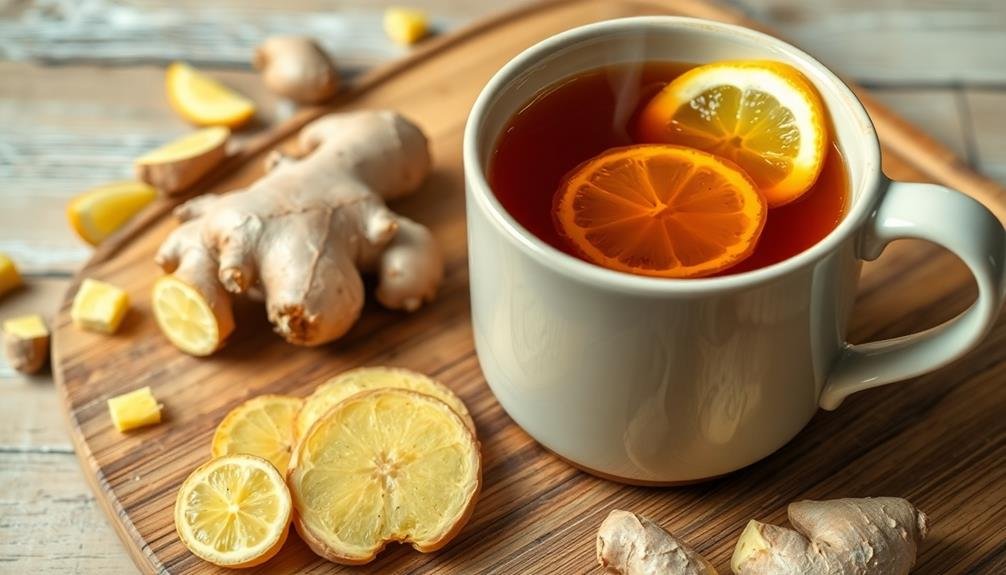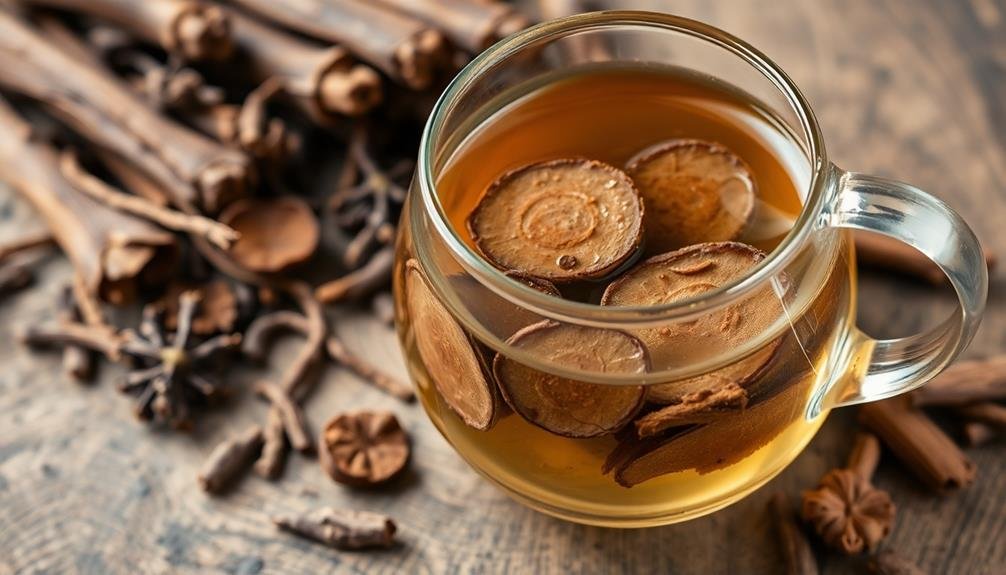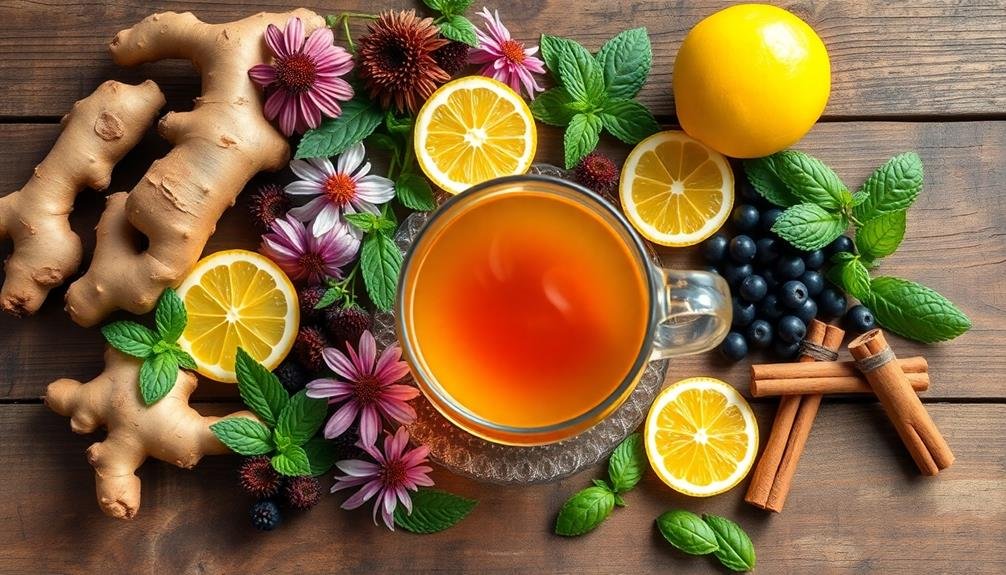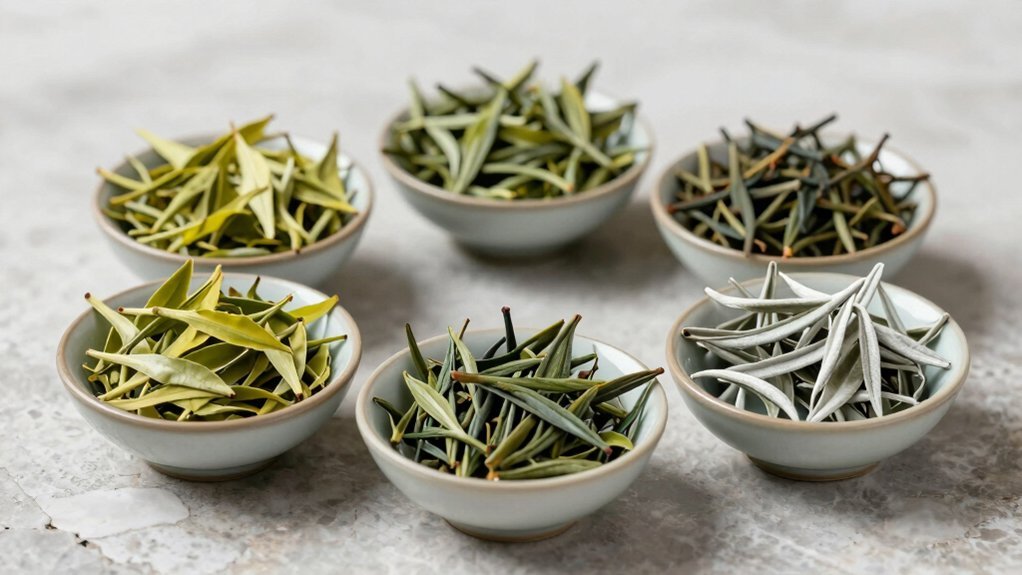Boost your immune defenses with these seven powerful herbal tea ingredients. Echinacea reduces cold chances and duration, while elderberry fights flu symptoms. Ginger combats inflammation and eases digestion. Astragalus, a Chinese medicine staple, enhances your body's ability to fight infections. Licorice root helps you cope with stress and soothes sore throats. Turmeric's curcumin offers strong anti-inflammatory benefits, especially when paired with black pepper. Finally, reishi mushroom enhances white blood cell function and manages stress. Each of these natural defenders brings unique properties to support your overall health. Discover how to harness their full potential for a stronger immune system.
Echinacea: Nature's Immune Booster

Three key species of Echinacea have been used for centuries to boost the immune system. These include Echinacea purpurea, Echinacea angustifolia, and Echinacea pallida. Native Americans first discovered the plant's medicinal properties, using it to treat various ailments.
When you brew Echinacea tea, you're tapping into a powerful blend of active compounds. These include alkamides, phenolic acids, and polysaccharides, which work together to stimulate your immune system. Echinacea can increase the production of white blood cells, enhance their activity, and promote the release of interferons – proteins that help your body fight viral infections.
Research suggests that Echinacea may reduce your chances of catching a cold by up to 58% and shorten its duration by 1.4 days. It's most effective when you start taking it at the first sign of symptoms.
While generally safe, some people may experience mild side effects like nausea or dizziness. If you're allergic to plants in the daisy family, have an autoimmune disorder, or are taking immunosuppressants, consult your doctor before using Echinacea tea.
Elderberry: Antiviral Powerhouse
Elderberry's potent flu-fighting properties make it a standout ingredient in immune-boosting herbal teas.
You'll benefit from its ability to reduce the severity and duration of influenza symptoms.
Rich in antioxidants, elderberry also helps protect your cells from oxidative stress and supports overall immune function.
Potent Flu-Fighting Properties
Consistently topping the list of potent flu-fighting herbs, elderberry stands out as a true antiviral powerhouse. When you're feeling under the weather, turning to elderberry can provide significant relief.
Studies have shown that this dark purple berry can reduce the duration and severity of flu symptoms by inhibiting the virus's ability to replicate.
Elderberry's potency lies in its high concentration of flavonoids, particularly anthocyanins. These compounds have been found to boost your immune system and reduce inflammation.
When you consume elderberry tea, you're not just sipping a comforting beverage; you're arming your body with a natural defense against influenza viruses.
What makes elderberry so effective against the flu?
- It blocks the virus from entering and infecting healthy cells
- It stimulates your immune system to produce more virus-fighting antibodies
- It reduces inflammation, helping to alleviate symptoms like congestion and body aches
Rich in Antioxidants
Beyond its antiviral properties, elderberry is a treasure trove of antioxidants. These powerful compounds help protect your cells from oxidative stress and inflammation, bolstering your overall immune function. Elderberry contains high levels of flavonoids, particularly anthocyanins, which give the berries their deep purple color and contribute to their potent antioxidant effects.
When you brew elderberry tea, you're extracting these beneficial compounds, creating a drink that's not only tasty but also packed with immune-boosting potential. The antioxidants in elderberry tea can help neutralize free radicals in your body, reducing cellular damage and supporting your immune system's ability to fight off infections.
Regular consumption of elderberry tea may also contribute to better heart health, improved skin condition, and enhanced cognitive function.
It's crucial to recognize that while elderberry is generally safe, you should always use properly prepared, commercially available products or consult an herbalist for guidance on preparing your own tea.
Ginger: Inflammation-Fighting Root

Ginger's potent anti-inflammatory properties make it a powerful ally in your immune defense arsenal.
You'll find this versatile root effective in combating cold symptoms, helping to reduce congestion and soothe sore throats.
Beyond respiratory benefits, ginger can also ease digestive discomfort, making it a well-rounded addition to your herbal tea blend.
Potent Anti-Inflammatory Properties
The powerful anti-inflammatory properties of ginger stand out among herbal remedies. When you brew ginger tea, you're tapping into a natural defense against inflammation throughout your body. Ginger's active compounds, including gingerols and shogaols, work to inhibit inflammatory pathways and reduce the production of pro-inflammatory molecules.
You'll find that regular consumption of ginger tea can help alleviate various inflammatory conditions. It's particularly effective in reducing muscle pain and soreness after exercise, as well as easing joint discomfort associated with arthritis.
Ginger's anti-inflammatory effects extend to your digestive system, potentially soothing gastrointestinal irritation and reducing bloating.
To maximize ginger's potent benefits in your tea, consider:
- Using fresh ginger root for a more robust flavor and higher concentration of active compounds
- Steeping the ginger for at least 10 minutes to extract its beneficial properties fully
- Combining ginger with other anti-inflammatory ingredients like turmeric or lemon for a synergistic effect
Combats Cold Symptoms
When cold symptoms strike, ginger tea offers a soothing and effective remedy. This warming brew can help alleviate congestion, ease sore throats, and reduce coughing. Ginger's natural compounds, including gingerols and shogaols, have powerful antiviral properties that can help fight off cold-causing viruses.
You'll find that ginger tea can provide quick relief for various cold symptoms. Here's a breakdown of its benefits:
| Symptom | How Ginger Helps |
|---|---|
| Congestion | Clears nasal passages |
| Sore throat | Soothes irritation |
| Coughing | Suppresses cough reflex |
| Headache | Reduces inflammation |
| Nausea | Calms stomach discomfort |
To make the most of ginger's cold-fighting properties, steep fresh ginger slices in hot water for 5-10 minutes. You can add honey for extra soothing effects and lemon for a vitamin C boost. Drink this tea 2-3 times daily when you're feeling under the weather. Remember, while ginger tea can help manage symptoms, it's not a cure for the common cold. If your symptoms persist or worsen, consult your healthcare provider for proper medical advice.
Soothes Digestive Discomfort
Along with its cold-fighting properties, ginger tea shines as a potent digestive aid. This inflammation-fighting root has been used for centuries to soothe upset stomachs and ease digestive discomfort. When you're feeling bloated or nauseous, a warm cup of ginger tea can provide quick relief.
Ginger's active compounds, including gingerols and shogaols, work to reduce inflammation in your digestive tract. They also stimulate the production of digestive juices and enzymes, helping to break down food more efficiently. This can alleviate symptoms of indigestion, gas, and bloating.
If you're prone to motion sickness or morning sickness during pregnancy, ginger tea can be your go-to remedy. It's known to calm nausea and reduce vomiting, making it a natural alternative to over-the-counter medications.
Here's why you'll love ginger tea for digestive health:
- It's a comforting, warm hug for your upset stomach
- You'll feel relief without harsh side effects
- It's a natural, time-tested remedy your grandmother would approve of
Incorporate ginger tea into your daily routine to support your digestive health and boost your immune system simultaneously.
You'll be amazed at how this simple beverage can make a significant difference in your overall well-being.
Astragalus: Traditional Chinese Medicine Staple
Revered in Traditional Chinese Medicine for centuries, astragalus has earned its reputation as a potent immune-boosting herb. You'll find this adaptogenic root in many immune-supporting herbal tea blends, and for good reason. Astragalus contains compounds called polysaccharides and saponins, which are believed to stimulate your immune system and increase the production of white blood cells.
When you're looking to fortify your body's defenses, astragalus can be a valuable ally. It's known to enhance your body's natural ability to fight off infections and may even help reduce the frequency and severity of common colds.
Additionally, astragalus has been shown to possess anti-inflammatory properties, which can contribute to overall health and well-being.
To incorporate astragalus into your wellness routine, steep dried astragalus root slices in hot water for 10-15 minutes. You can also find it in pre-packaged tea blends or as a supplement.
While generally safe for most people, it's always wise to consult with a healthcare professional before adding new herbs to your diet, especially if you're pregnant, nursing, or taking medications.
Licorice Root: Adaptogenic Herb

A powerful adaptogen, licorice root has been used for centuries in various traditional medicine systems. It's known for its ability to help your body cope with stress and maintain balance. When you add licorice root to your herbal tea blend, you're tapping into a natural immune booster that can support your overall health.
Licorice root contains glycyrrhizin, a compound with potent anti-inflammatory and antiviral properties. This makes it particularly effective in fighting off respiratory infections and soothing sore throats. It's also been shown to enhance the activity of your body's natural killer cells, which are essential for immune defense.
- Feel the warmth of ancient wisdom flowing through your cup
- Embrace the gentle strength of nature's healing touch
- Savor the sweet, earthy flavor that whispers of liveliness
When brewing licorice root tea, remember that a little goes a long way. Its natural sweetness can be overpowering, so start with small amounts and adjust to your taste.
Be aware that while licorice root offers numerous benefits, it's not suitable for everyone. If you have high blood pressure, kidney disease, or are pregnant, consult your healthcare provider before incorporating it into your routine.
Turmeric: Golden Spice Defender
From the earthy sweetness of licorice root, we turn to the vibrant golden hue of turmeric. This powerful spice, renowned for its anti-inflammatory properties, is a potent addition to your immune-boosting tea arsenal. Curcumin, the active compound in turmeric, helps strengthen your body's defenses against pathogens and oxidative stress.
When brewing turmeric tea, you'll want to add black pepper to enhance curcumin absorption. A pinch of this spice can increase bioavailability by up to 2000%. For maximum benefits, steep your turmeric tea for 10-15 minutes, allowing the golden color to fully develop.
| Turmeric Tea Benefits | Preparation Tips | Flavor Enhancers |
|---|---|---|
| Anti-inflammatory | Use fresh root | Ginger |
| Antioxidant-rich | Add black pepper | Lemon |
| Immune-boosting | Steep 10-15 mins | Honey |
You can enjoy turmeric tea hot or cold, making it a versatile drink for any season. Its slightly bitter, earthy taste pairs well with other immune-boosting ingredients like ginger and lemon. By incorporating this golden spice into your daily routine, you're giving your immune system a powerful ally in the fight against illness.
Reishi Mushroom: Immunity Enhancing Fungus

Wisdom from ancient Eastern medicine brings us to the potent reishi mushroom, a powerful ally for your immune system. This remarkable fungus has been revered for centuries in traditional Chinese medicine for its ability to boost overall health and wellness.
When brewed into a tea, reishi offers a wealth of immune-enhancing benefits that can help fortify your body's natural defenses.
Reishi mushrooms contain beta-glucans, polysaccharides, and triterpenes, which work together to stimulate your immune system. These compounds enhance the function of your white blood cells, helping them identify and neutralize harmful pathogens more effectively.
Additionally, reishi's adaptogenic properties can help your body cope with stress, which is essential for maintaining a robust immune response.
To incorporate reishi into your daily routine, try steeping dried mushroom slices or powder in hot water for 15-20 minutes. The resulting tea has a slightly bitter, earthy taste that you can enhance with honey or lemon.
Regular consumption of reishi tea may:
- Boost your body's resilience against common illnesses
- Support your overall well-being and wellness
- Provide a sense of calm and balance in your daily life
Frequently Asked Questions
Can Pregnant Women Safely Consume These Immune-Boosting Herbal Teas?
While you're pregnant, it's best to be cautious with herbal teas. Some can be safe, but others may pose risks. Always consult your doctor before consuming any herbal tea during pregnancy to guarantee your and your baby's safety.
How Long Does It Take to See Benefits From Drinking These Teas?
You'll likely notice benefits from drinking these teas within a few weeks. However, it's important to remember that everyone's body is different. You should consistently consume them as part of a healthy lifestyle for best results.
Are There Any Potential Side Effects or Drug Interactions With These Herbs?
You should be aware that herbs can have side effects and interact with medications. It's best to consult your doctor before starting any herbal regimen, especially if you're pregnant, nursing, or taking prescription drugs.
Can Children Drink These Herbal Teas for Immune Support?
You should be cautious about giving herbal teas to children. It's best to consult a pediatrician first, as some herbs can be too strong for kids. If approved, use weaker brews and monitor for any reactions.
What's the Recommended Daily Intake for Optimal Immune-Boosting Effects?
For ideal immune-boosting effects, you'll want to drink 2-3 cups of herbal tea daily. It's best to spread your intake throughout the day. Remember, consistency is key, so make it a regular part of your routine.
In Summary
You've now discovered seven potent herbal tea ingredients to bolster your immune system. By incorporating these natural defenders into your daily routine, you're taking proactive steps to protect your health. Don't underestimate the power of a simple cup of tea. Whether you're fighting off a cold or just aiming to stay well, these herbs can be your allies. Try them individually or create your own immune-boosting blend. Your body will thank you.





Leave a Reply